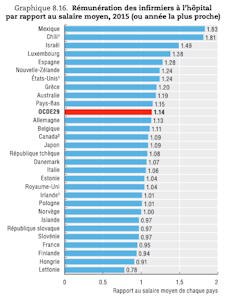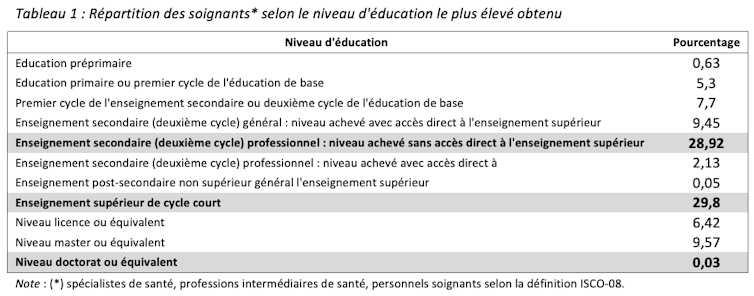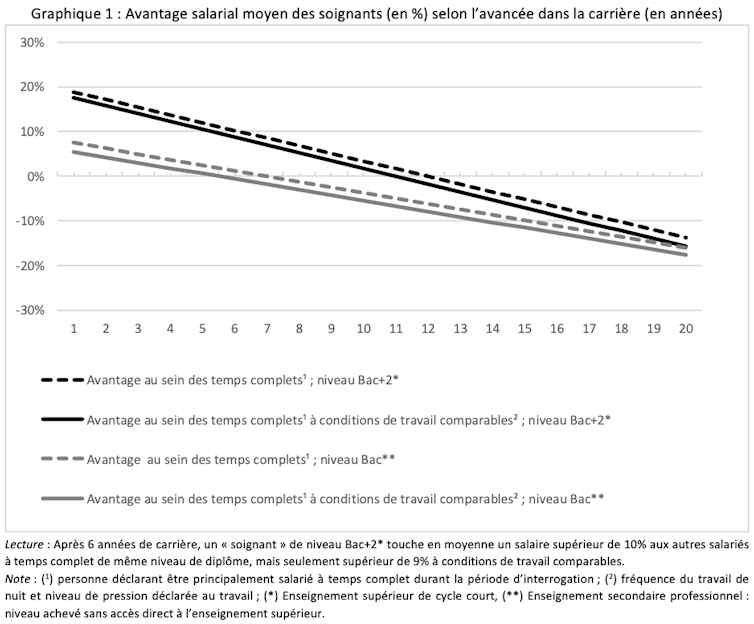Covid-19: Do caregivers' pay and careers match their social usefulness?
Pierre Courtioux, Economist and Arnaud Chéron, Director of EDHEC Economics à l'EDHEC Business School, in an article originally published in French in The Conversation discusses the wages and careers of carers compared to their social usefulness.
The head of state invited everyone to remember that "our country depends entirely on the women and men our economies recognize and pay so poorly". These include, of course, many of our 1.6 million caregivers, including some 660,000 nurses and 390,000 orderlies.
From an economic point of view, talking about a scale of (social) values brings us back to the question of the scale of remuneration. What's the situation of today's caregivers?

According to OECD data published in 2017, for example, the salary of public hospital nurses is particularly low, on average 5% below the national average wage, ranking France among the bottom 5 of the 29 developed countries considered.
However, in order to provide a precise answer to the question we are asking, a certain number of "precautions" need to be taken, of the same order as those invoked when evaluating the efficacy of a drug.
In fact, we are entering into a perspective of evaluating the return on diplomas, or more generally, investments in human capital (measured by the level of initial education and the number of years of work experience), which should be carried out all other things being equal.
Benefits that don't last
The relative value attributed to a profession, as measured by its remuneration, must be assessed for equivalent levels of qualification. To this end, economic analysis proposes the study of compensatory wage differences. This line of reasoning must also include "controlling" for differences in working hours and any pay bonuses directly associated with certain conditions relating to the arduousness of the tasks performed at the workstation. All these controls are designed to effectively measure a relative "net" value.
Secondly, a life-cycle approach also seems appropriate, as things are not immutable: at a certain stage in an individual's career, a trade may benefit from above-average remuneration, which does not last, or even translates into undervaluation for different levels of experience.
Les premières estimations obtenues, lorsque l’on tient compte au mieux de ces différents effets, permettent de construire un panorama un peu plus précis de la carrière des soignants.
In France, the highest level of diploma obtained by our caregivers during their initial training is quite broad, covering the whole spectrum of diploma levels produced by our educational system.
Nevertheless, 30% have a diploma level corresponding to short-cycle higher education, mainly nurses; this is followed by a "second battalion" with slightly fewer diplomas, having obtained a vocational secondary education diploma without direct access to higher education (29%).

At the start of their career, for graduates of short higher education courses, and focusing on full-time carers, salaries are 19% higher than the average obtained for an equivalent level of qualification.
When we then take into account the fact that part of the salary does not directly remunerate the status of "carer", but rather the arduous nature of the profession, particularly night work, this salary advantage is slightly lower, but roughly of the same order.
Salary malus
For the "second battalion", this apparent advantage at the start of the career is of the order of 7% when we focus on people working full-time, and is not significantly different from 0% when we take into account differences in working conditions.
This panorama of caregivers' salaries at the start of their careers is almost reassuring: being "mobilizable" and "dedicated" during health crises such as the Covid-19 epidemic would give rise to a salary bonus... at least for nurses.
However, according to our estimates, this bonus rapidly disappears as the career progresses, even turning into a substantial malus. For nurses, the bonus has disappeared after 12 years; and after a 20-year career, we estimate that these caregivers earn 16% less than other full-time employees, all other things being equal.

For the "second battalion", too, career advancement means a salary penalty estimated at 18% over a 20-year career. The fact that our caregivers continue their missions and do not desert the hospital after a few years can be explained either by the fact that they are "trapped" in their career, or by the existence of intrinsic motivations in their work. It would then be in the actual performance of their work that our caregivers would find a non-monetary remuneration, offsetting this salary malus.
Whether this balance is explained by the fact of being trapped in one's career or by intrinsic motivations, it seems to us very dangerous to return to business as usual after the Covid-19 crisis. In this respect, the French President's speech, highlighting the common utility of certain professions and inviting us to rethink the scale of remuneration, seems reassuring to us if it is not limited to an announcement effect.
Bravos for caregivers, who deserved them long before the Covid-19 epidemic, will not suffice. Let's hope that, as we emerge from the current health crisis, words will be followed by deeds, and that new resources will be allocated to hospitals. In the meantime, on April 15, French Prime Minister Édouard Philippe announced that a bonus of between 500 and 1,500 euros would be paid in May to staff involved in managing the coronavirus epidemic.
This article is republished from The Conversation under a Creative Commons licence. Read the original article.




